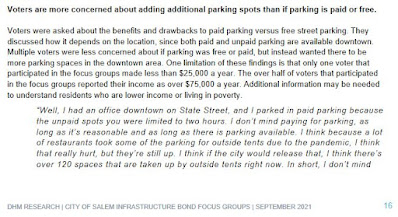Council convenes on Monday and they lead with a formal Work Session on concepts for a bond measure.
Cooking up a bond and figuring out the best ratio of bond sweetener to healthy food and good medicine seems tricky.
Still, the report on focus group testing has two things that just seem odd.
 |
| Nothing on climate |
One is an omission. They didn't ask about climate projects. If this is the big bond for a decade's worth of projects, why aren't we planning for climate? This just seems like a very significant omission and lack of foresight. Of course, it is not too late to introduce that into the process.
The other is the decision to ask if people wanted free parking. Of course people like free! How is this useful information? Is the City considering a new parking structure a "bond sweetener" to make the whole package more palatable?
 |
| Looping search, shared parking, "I will pay" |
Still, even with terrible framing, and the decision not to share research on parking utilization, people in the focus groups said, "I will pay."
 |
| "I don't mind paying" |
When are we going to change the conversation about parking? When people say "there is no parking," why doesn't the city show parking studies and data to contest or qualify those assertions? Why don't we remind people that 53% of our emissions come from driving? Why don't we use these things to introduce and push out the theoretical framework of Donald Shoup in the High Cost of Free Parking and Parking and the City? The whole way we talk about parking is old and limited, and needs a thorough rethink.
 |
| Climate Action Plan, Oct. 2021 draft |
 |
| Task Force recommendation, 2018 |
Altogether there's no coordination here with the early recommendation from the Climate Action Plan or picking up the thread in the Congestion Relief Task Force on parking.
The materials also point to a bond in Denver as a model, but it had a lot of "improvement and expansion" for a bond billed as a "maintenance" bond. See a few notes on that here from May.
When we talk about "maintenance," there is an opportunity also to talk about ways that shiny new stuff now creates future maintenance obligations, and to do a Strong Towns/Urban3 style analysis of tax efficiency.
 |
| Here's downtown Eugene value/acre |
You may recall notes on Eugene's analysis from 2017. (Have other nearby cities done them? I feel like there are other examples, but I can't recall.)
 |
| It's like bananas: By the bunch, or by the pound |
Separately, as a linked agenda item on the regular Council meeting to initiate development of a bond, the Staff Report claims "The most urgent need is to replace the City’s fire trucks and apparatus."
Our former Secretary of State, Phil Keisling, wrote about the proportion of medical calls a few years back in "Why We Need to Take the ‘Fire’ Out of ‘Fire Department’." Even trade publications talk about it, in articles like "More Departments Choose Smaller Fire Apparatus to Handle Typical Runs." And here's a Streetsblog piece, "How Fire Departments Stopped Worrying and Embraced Safer Street Design." And at Bloomberg, "The Fire Trucks Are Too Damn Big."
Smaller, more nimble fire trucks should be included in any specifications for equipment.
And there is a resolution to fund bond development and communication with $170,000.
 |
| Summary of housing incentives |
The City of Salem Economic Development Strategy and Covid-19 Recovery Plan was very interesting and might deserve more later.
In it was a nice list of housing incentive programs, but missing was any kind of summary accounting of the total cost of the programs and the return on them. How big a bite do they take out of property tax revenue?
Overall it doesn't include much reflection on what programs are especially effective and what might not be effective.
And there is the final purchase on the UGM/Saffron block, what had been a notch on Chemeketa Street out of the corner with the State Insurance Building. (Recently on the State Insurance Building history here and on the notch here. The corner of Chemeketa and Front will remain separate.)


4 comments:
What would the cost be to have a study done like the one in Eugene?
I'm shocked to see that building more affordable housing is not high on the list since a majority of citizens say that homelessness is their highest priority. Or perhaps the staff interprets that as get rid of the homeless, not house the homeless.
The City has wanted to replace the fire engines and upgrade their communication equipment for many years. Those trucks are said to only last about 10 years. That seems way to short to me. Hope I'm wrong.
And when they were looking at building the new Police station an engineering study showed that not only is the City Hall in bad shape now, but in a modest earthquake it would pancake and kill many people inside.
Re:cost. I feel like I've seen that somewhere in the last couple of years, but i can't recall where. If/when I remember, I'll link and/or update here.
Re:affordable housing. I think that "hobo evaporation" is the preferred policy solution of many, alas.
Hopefully the City will at some point publish a kind of draft recommendation that balances bond sweetener and popular ideas with longer-term need. It's hard to see how a City Hall seismic project doesn't get included in any bond.
(Edit: Described the corner of Chemeketa and Front incorrectly, and just deleted it, since it didn't contribute anything to the discussion of the purchase and redevelopment project.)
Post a Comment